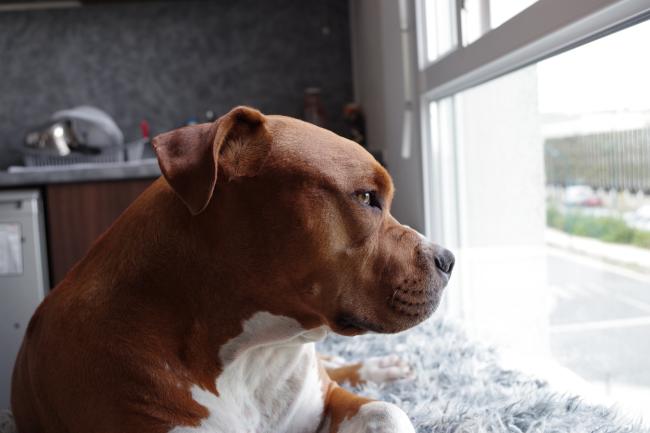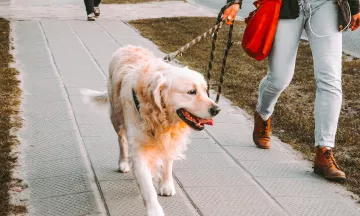Are you bringing a dog into your home? This is such an exciting time, but at some point you might feel some trepidation about the level of commitment your new family member will need. Also, if you want to become a dog sitter it's important to ask yourself: how much time should I provide to a dog to make sure they are happy and healthy?
How long can a dog be alone?
This is something every pet parent has to consider. Obviously, this will differ between individual dogs and dog breeds. Some dogs start to feel anxious after only two minutes without their owners, other dogs can quite happily be alone for 5 hours without chewing on shoes or messing up the house ;-). However, bear in mind that most dogs are not happy to be alone at all. Dogs want to please and aren't quick to complain, so even if a dog seems happy alone, they may still feel miserable and eventually end up being depressed and lonely.
In any case, every dog should have the proper training to stay alone. You can slowly build up the alone-time from 5 minutes to an hour and gradually up until 3-4 hours. Really take the time for this process: in fact, your dog shouldn't be left alone at all during the first 2-3 months of ownership. In more severe cases of your dog not coping with being alone, you can read up on how you deal with separation anxiety here.

A puppy or an older dog?
Of course, it's very exciting to bring a puppy into your home! But those irresistible fluffies do turn your life upside down. You can almost compare the work and attention involved in caring for an 8-week old puppy to looking a human baby. Puppies play, eat, sleep, explore, chew - and that goes on and on (and on!) throughout the day. The best approach is to take your puppy out for a toilet break after every nap and every meal. In time, your puppy will require less attention. But remember - the education, training and play-time will continue to demand a lot of time and energy. If possible, take some time off from work for the first 3 to 6 weeks, or arrange for a pet sitter to be around to keep your puppy company.
An older dog (generally) requires less intensive care than a young, active dog. But older dogs may require different attention: some dogs need more affection or medical care as they age. Dogs with an unclear history, such as shelter dogs, can also have problems with separation anxiety, fear or other behavioral problems. Think carefully about what would fit into your life: do you enjoy spending times outdoors and being active every day? Or do you prefer a quiet walk and lots of cuddling on the couch? Choose the dog that suits your character and lifestyle.
Breed and character
Each individual dog is different, but characteristics between breeds can vary considerably. Labradors or Maltese, for example, are often friendly family dogs. Kelpies or Border Collies need more stimulation and training time. A busy family with young children may do better with a dog that is easy to train and friendly with kids and other pets. Maybe you live on your own, are an experienced dog owner and would be comfortable with a dog that is very owner-oriented. In that case, you might choose a dog that you can spend a lot of time training and playing with, and really build a special bond and a beautiful life together.
Take the time to do some research on different breeds. Of course, you can also go for a mixed breed pooch from a shelter or a rescue center. Mixed breeds can be very fun, friendly and healthy dogs - plus, you know you will be saving a precious life! However, your dog's character traits might be a little trickier to predict than with recognized breeds, so do your research. And always sure you get your dog from a reliable pet shelter or breeder.
Also, if you want to become a dog sitter, think about what kind of dog breeds and personality are a great match for your situation. If you have a Pawshake profile, you can indicate whether you accept small dogs, male or female dogs etc.
Can you combine work and a dog?
Dogs require a lot of time and effort, but if you can manage to involve a dog in your daily life, a dog won't ever feel like a burden! It may seem impossible to have enough time for a dog when you work full-time. Nevertheless, it is still possible in many situations. Talk with your workplace about your plans of having a dog. Can you make agreements about working from home or flexible hours? Maybe it is even possible to take the dog to work?
Pets at work improve social connections, increase productivity and reduce stress. How could any employer resist that? Of course, not every work environment is suitable for dogs, and not all employers and colleagues are as fond of dogs as others (think of allergies, genuine fear of dogs, etc). Also, some dogs don't like being around 'new people' at all. But in any case, have a chat with your employer and colleagues about your plans, so that they can discuss and support you in your new life as a dog-parent.
Do you have back-up support?
Even if you're really motivated, it's an illusion that you can always provide 100% care for your dog 24/7. Situations will sometimes come up where you need a hand taking care of your dog. Think of hospital visits, weddings and parties where dogs aren't welcome, or just holidays and work. Provide a few good backup carers from early on. Ask your friends, family and neighbours if they're interested in looking after your dog every once in a while. It really gives peace of mind to have a great second home in your address book with people that you trust and where your dog feels at ease. Of course, you can always find a pet sitter online in your area via en.pawshake.de - a great alternative to a dog kennel:)
A friend for life
So - how much time do you really need to take care of your dog? The answer is that it differs between individual dogs. Yes, a dog will always ask a lot of your time and energy. But if you are willing to put that in, it is so worth it! The dog will become part of your life and not a 'chore' you have to take care of every day.
With proper care, you can prevent problem behavior in your dog such as boredom, aggression, and even depression. If your dog gets enough exercise, structure, love and stimulation, they will be quiet, healthy and easy going. In short, you will have a best friend for life!






